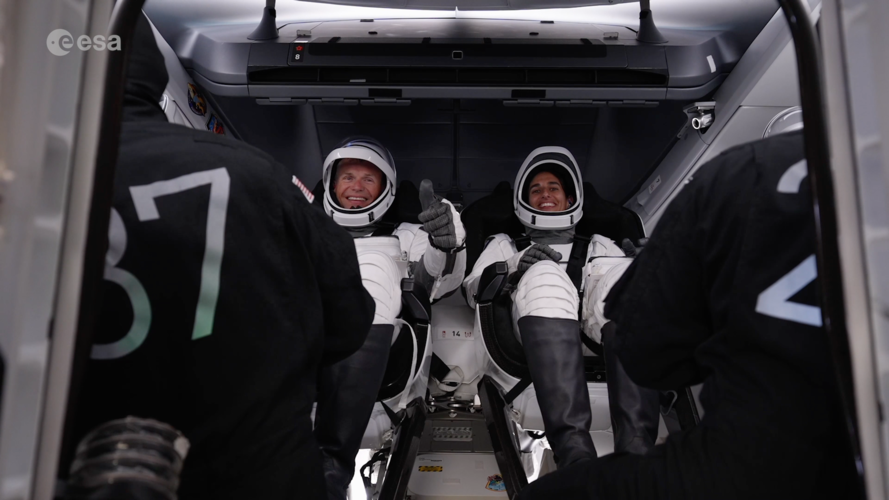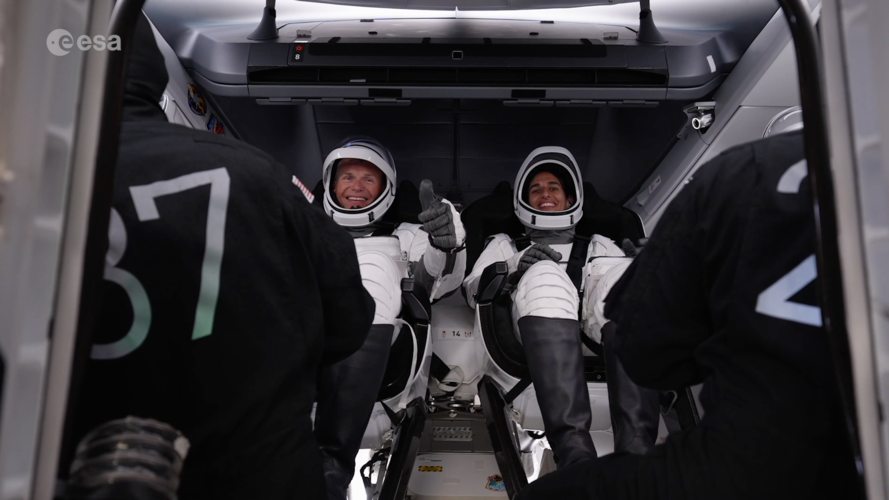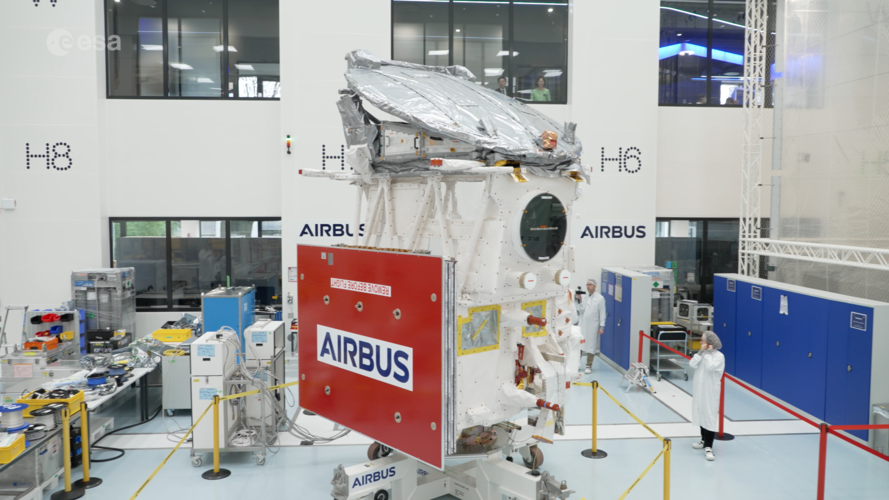The Whispering of Huginn
Friday, 08 March 2024 13:00 Video:
00:04:00
Video:
00:04:00
Andreas Mogensen launched on his Huginn mission in August 2023 to the International Space Station, becoming the first non-US astronaut to pilot SpaceX’s Crew Dragon spacecraft. Andreas became commander of the International Space Station in September 2023, becoming the longest serving European commander in January 2024. His mission was spent on more than 30 European experiments and plenty of international ones as well, ranging from water purification to studies of human physiology and thunderclouds. After 6 months on the International Space Station, Andreas will come down to Earth together with his Crew-7 crewmates Jasmin Moghbeli (NASA), Satoshi
This Whispering of Huginn
Friday, 08 March 2024 13:00 Video:
00:04:00
Video:
00:04:00
Andreas Mogensen launched on his Huginn mission in August 2023 to the International Space Station, becoming the first non-US astronaut to pilot SpaceX’s Crew Dragon spacecraft. Andreas became commander of the International Space Station in September 2023, becoming the longest serving European commander in January 2024. His mission was spent on more than 30 European experiments and plenty of international ones as well, ranging from water purification to studies of human physiology and thunderclouds. After 6 months on the International Space Station, Andreas will come down to Earth together with his Crew-7 crewmates Jasmin Moghbeli (NASA), Satoshi
Astro Chat with Rosemary Coogan | ESA Explores podcast
Friday, 08 March 2024 13:00 Video:
00:21:52
Video:
00:21:52
Rosemary Coogan, one of ESA’s five astronaut candidates currently undergoing basic astronaut training at the European Astronaut Centre in Cologne, Germany, shares her journey from studying the stars to training for space travel. Join us as we discuss her experiences in astronaut training, her favorite lessons, and her excitement for the future of space exploration.
This is Episode 4 of our ESA Explores podcast series introducing the ESA astronaut class of 2022, recorded in November 2023.
Music and audio editing by Denzel Lorge. Cover art by Gaël Nadaud.
EarthCARE bids adieu to Europe
Friday, 08 March 2024 10:00 Video:
00:03:29
Video:
00:03:29
After years of development and a rigorous testing programme, ESA’s EarthCARE satellite has left Munich, Germany, and is now on its away to SpaceX’s launch site in Vandenberg, California. Once it arrives, it will be put into storage for a few weeks until it is time to ready the satellite for liftoff – which is scheduled to launch in May on a Falcon 9 rocket.
The Earth Cloud Aerosol and Radiation Explorer, or EarthCARE for short, is the most complex Earth Explorer mission to date. The new satellite will look at the role that clouds and aerosols play in heating and
The geodetic community meets Genesis
Friday, 08 March 2024 09:45
The first Genesis science workshop brought together the ESA project team and the scientific geodesy community to establish the Genesis Scientific Exploitation Team and to set the ground for future collaboration.
Space-enabled connectivity steers self-driving cars
Friday, 08 March 2024 09:12
In one of the longest-running trials of a self-driving vehicle, collecting data over 13 000 km of autonomous travel, Darwin Innovation Group has been testing a novel driverless shuttle bus at Harwell Science and Innovation Campus, in Oxford, UK; home to ESA’s European Centre for Space Applications and Telecommunications (ECSAT). The technology is funded under the ESA 5G/6G Programme with the support of the UK Space Agency.
Conversations with ESA Directors on International Women’s Day
Friday, 08 March 2024 08:00
For International Women's Day 2024, we're acknowledging the remarkable careers of the women in key Directorate positions at ESA: Simonetta Cheli, Geraldine Naja and Carole Mundell. Read about the impactful work, pivotal life experiences and their insights on fostering a more inclusive future.
Earth from Space: Ireland
Friday, 08 March 2024 08:00 Image:
The lush landscape of the island of Ireland and the coasts of Scotland, Wales and England, are pictured in this view from the Copernicus Sentinel-3 mission.
Image:
The lush landscape of the island of Ireland and the coasts of Scotland, Wales and England, are pictured in this view from the Copernicus Sentinel-3 mission. Rocking robotics training
Friday, 08 March 2024 07:19 Image:
ESA astronaut candidate Raphaël Liégeois from Belgium during a robotics session as part of his basic astronaut training at ESA’s European Astronaut Centre, near Cologne, Germany.
Image:
ESA astronaut candidate Raphaël Liégeois from Belgium during a robotics session as part of his basic astronaut training at ESA’s European Astronaut Centre, near Cologne, Germany. How do animals react during a total solar eclipse? Scientists plan to find out in April
Friday, 08 March 2024 06:23
Full Disclousre: Enhanced Radiation Warnings for Space Tourists
Thursday, 07 March 2024 20:40 In a groundbreaking study led by space weather experts at the University of Surrey, there's a growing call for immediate action to safeguard the burgeoning space tourism industry from the invisible threat of cosmic radiation. The study, recently published in Space Policy, emphasizes the urgent need for collaboration between regulators and space tourism companies to enhance passenger and crew pro
In a groundbreaking study led by space weather experts at the University of Surrey, there's a growing call for immediate action to safeguard the burgeoning space tourism industry from the invisible threat of cosmic radiation. The study, recently published in Space Policy, emphasizes the urgent need for collaboration between regulators and space tourism companies to enhance passenger and crew pro 








